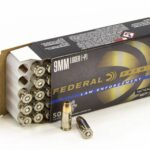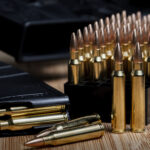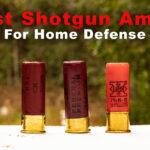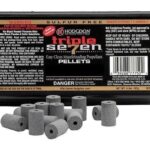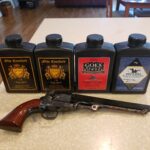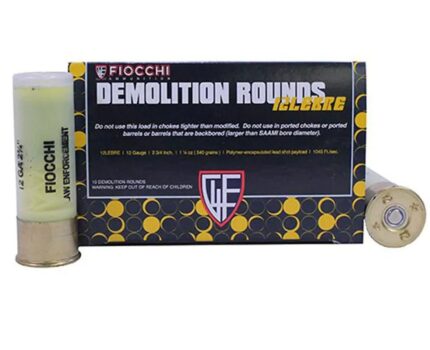Shotgun Ammo
Shotgun ammo, commonly referred to as shotgun shells or shotgun rounds, is designed for use in shotguns. Shotguns are versatile firearms that can be used for various purposes, such as hunting, sport shooting, home defense, and law enforcement. Here are some key details about shotgun ammunition:
1. Gauge: Shotguns are categorized by gauge, which refers to the internal diameter of the shotgun's barrel. Common shotgun gauges include 12 gauge, 20 gauge, 28 gauge, and .410 bore (not technically a gauge but a caliber measurement).
2. Shot Types: Shotgun ammunition typically contains multiple projectiles called shot. The size and number of shot pellets vary based on the intended use. Common shot types include birdshot, buckshot, and slug.
- Birdshot: Birdshot is used primarily for hunting birds and small game. It consists of multiple small pellets, typically made of lead or steel, and is available in different sizes, such as #7.5, #8, and #9.
- Buckshot: Buckshot is designed for self-defense and hunting larger game. It consists of larger lead or steel pellets, usually ranging from #000 (triple-aught) to #4 in size. The number of pellets in a buckshot load depends on the shell length and intended purpose.
- Slug: Shotgun slugs are single large projectiles used for hunting larger game or as a self-defense option. They are solid projectiles made of lead or other materials and are available in various designs, including foster slugs and sabot slugs.
3. Shell Length: Shotgun shells come in various lengths, typically ranging from 2.75 inches to 3.5 inches, depending on the gauge and intended use. Longer shells generally have larger powder capacities, allowing for more power and increased shot or slug velocity.
4. Shotshell Configurations: Shotgun shells come in different configurations, including:
- High brass: Refers to shotgun shells with a higher brass base, indicating a higher powder charge and increased power.
- Low brass: Shotgun shells with a lower brass base, indicating a lower powder charge and reduced power. These are commonly used for lighter target loads.
5. Specialty Loads: In addition to the standard birdshot, buckshot, and slug loads, there are specialty shotgun loads available, such as:
- Less-lethal rounds: These rounds are designed for use in law enforcement or riot control situations, using projectiles like rubber or beanbag rounds.
- Exotic rounds: These include specialty rounds like incendiary rounds, armor-piercing rounds, and other unique designs. The legality of these rounds may vary depending on local laws and regulations.
It's important to note that specific shotgun ammunition options can vary depending on local laws and regulations, as well as individual firearm compatibility. Always follow the manufacturer's recommendations and adhere to local laws when selecting and using shotgun ammunition.
12 gauge shotgun Ammo
A 12 gauge shotgun is one of the most popular and widely used shotgun gauges. It is commonly used for various purposes, including hunting, sport shooting, home defense, and law enforcement. Here are some key details about the 12 gauge shotgun:
1. Gauge: The term "gauge" refers to the bore diameter of a shotgun. In the case of a 12 gauge shotgun, the bore diameter is approximately .729 inches, which is larger than smaller gauges like 20 gauge or 28 gauge.
2. Versatility: The 12 gauge shotgun is known for its versatility and capability to handle a wide range of loads. It can accommodate different types of ammunition, including birdshot, buckshot, slugs, and specialty rounds.
3. Shot Types: The 12 gauge shotgun can be loaded with various shot types, depending on the intended use:
- Birdshot: Birdshot loads consist of multiple small pellets designed for hunting birds and small game. They are typically used for recreational shooting and hunting small, fast-moving targets.
- Buckshot: Buckshot loads contain larger pellets and are primarily used for self-defense and hunting larger game. The number of pellets in a buckshot load can vary, with common sizes ranging from 000 (triple-aught) to #4.
- Slugs: Shotgun slugs are single, large projectiles used for hunting larger game or as a self-defense option. They provide increased accuracy and range compared to shot loads. Slugs can be either traditional lead slugs or sabot slugs, which are designed to be fired through rifled shotgun barrels.
4. Shell Length: 12 gauge shotgun shells come in various lengths, including 2.75 inches, 3 inches, and 3.5 inches. Longer shells generally have larger powder capacities, allowing for more power and increased shot or slug velocity.
5. Recoil: Due to its larger bore size, 12 gauge shotguns tend to produce more recoil compared to smaller gauge shotguns. The amount of recoil experienced can vary depending on factors such as the specific shotgun model, ammunition load, and the shooter's technique and body size.
6. Availability: 12 gauge shotguns and ammunition are widely available and commonly found in gun stores, sporting goods stores, and online retailers. There is a wide selection of shotguns chambered in 12 gauge, ranging from pump-action and semi-automatic shotguns to break-action and bolt-action models.
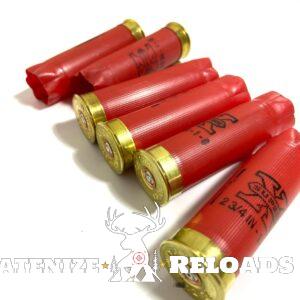
Shotgun Shells 12 Gauge
12 Gauge Shotgun Shells
12 gauge shotgun shells are the ammunition specifically designed for use in 12 gauge shotguns. Here are some key details about 12 gauge shotgun shells:
1. Shell Length: 12 gauge shotgun shells come in various lengths, the most common being 2.75 inches, 3 inches, and 3.5 inches. The length refers to the overall length of the shotgun shell case.
2. Shot Types: 12 gauge shotgun shells can be loaded with different types of shot, including:
- Birdshot: Birdshot shells contain multiple small pellets, usually made of lead or steel. They are used for hunting birds, small game, and recreational shooting. Birdshot sizes typically range from #9 (smaller pellets) to #4 (larger pellets).
- Buckshot: Buckshot shells are loaded with larger pellets, generally made of lead or steel. They are primarily used for self-defense and hunting larger game. Buckshot sizes commonly range from #000 (triple-aught) to #4, with #00 (double-aught) being a popular choice for self-defense.
- Slugs: Slug shells contain a single, large projectile instead of multiple shot pellets. Slugs are typically made of lead and are used for hunting larger game or for self-defense. They provide increased accuracy and range compared to shot loads.
3. Shell Configurations: Shotgun shells can have different configurations, including:
- High brass: High brass shotgun shells have a brass base that extends higher up the shell case, indicating a higher powder charge and increased power. They are often used for hunting and self-defense loads.
- Low brass: Low brass shotgun shells have a shorter brass base, indicating a lower powder charge and reduced power. They are commonly used for lighter target loads and recreational shooting.
4. Specialty Loads: In addition to standard birdshot, buckshot, and slug loads, there are specialty 12 gauge shotgun shells available for specific purposes, such as:
- Less-lethal rounds: These shells are designed for law enforcement or riot control situations and may contain rubber, beanbag, or other non-lethal projectiles.
- Specialty defense rounds: These shells may include features like reduced recoil, specialized wadding, or controlled expansion projectiles for enhanced self-defense performance.
5. Availability: 12 gauge shotgun shells are widely available and come from various manufacturers. They can be found in gun stores, sporting goods stores, and online retailers.
Different Types Of Shotgun Ammo
There are different types of shotgun ammunition available for various purposes and activities. Here are some of the most common types:
1. Birdshot: Birdshot shells are loaded with multiple small pellets, typically made of lead or steel. They are designed for hunting birds and small game. Birdshot is often used for recreational shooting, clay target sports, and pest control. Birdshot sizes range from #9 (smaller pellets) to #4 (larger pellets).
2. Buckshot: Buckshot shells contain larger pellets, usually made of lead or steel. They are primarily used for self-defense and hunting larger game. Buckshot sizes commonly range from #000 (triple-aught) to #4, with #00 (double-aught) being a popular choice. The number of pellets in a buckshot load depends on the shell length and intended purpose.
3. Slugs: Slug shells contain a single large projectile instead of multiple pellets. Slugs are solid projectiles, typically made of lead, and are used for hunting larger game or as a self-defense option. They offer increased accuracy and range compared to shot loads. Slugs can be either traditional lead slugs or sabot slugs, which are designed to be fired through rifled shotgun barrels.
4. Specialty Defense Rounds: These are shotgun shells designed specifically for self-defense purposes. They may include features such as reduced recoil, specialized wadding, or controlled expansion projectiles for enhanced performance in self-defense scenarios.
5. Less-Lethal Rounds: Less-lethal shotgun rounds are designed for law enforcement, riot control, or non-lethal self-defense situations. These rounds may contain rubber, beanbag, or other non-lethal projectiles intended to incapacitate or deter without causing fatal injuries.
6. Slug/Sabot Combination: Some shotgun shells feature a combination of a slug and a sabot. The sabot is a plastic sleeve that holds a smaller-diameter slug, allowing it to be fired accurately through a shotgun with a rifled barrel. This combination can provide improved accuracy and range for hunting and target shooting.
7. Specialty Loads: Specialty shotgun loads include a variety of unique designs and features. Examples include incendiary rounds, armor-piercing rounds, and other exotic types. It's important to note that the legality and availability of such specialty loads may vary depending on local laws and regulations.
Shotgun Ammo Walmart
As of my knowledge cutoff in September 2021, Walmart is known to carry shotgun ammunition, including various types of shotgun shells. However, specific availability may vary by location and over time.
To find shotgun ammo at Walmart, you can visit their website (www.walmart.com) and search for "shotgun ammo" or the specific type of shotgun ammunition you're looking for.
Alternatively, you can visit a Walmart store near you and check their sporting goods or hunting section. They typically have a selection of shotgun ammunition available for purchase.

